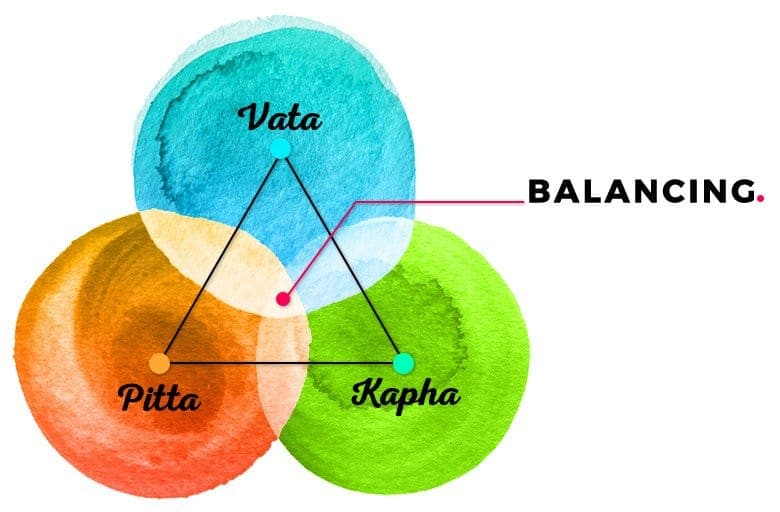
05 Sep 2025 - News
Follow a Balanced Ayurvedic Diet Based on Your Dosha (Vata, Pitta, or Kapha) to Maintain Optimal Health
Are you looking to improve your overall well-being and maintain optimal health?
One approach that has gained significant popularity is following a balanced Ayurvedic diet based on your dosha. Ayurveda, an ancient Indian system of medicine, emphasizes the importance of harmonizing the mind, body, and spirit for a healthy and balanced life.
This article will guide you through understanding doshas and how you can tailor your diet to support your specific constitution.
Introduction to Ayurveda and Doshas
Ayurveda, often called the "science of life," is a holistic healing system that originated in India thousands of years ago. It revolves around the concept of doshas, which are three distinct energy types: Vata, Pitta, and Kapha. Each dosha governs specific physical and psychological functions in the body.

Vata Dosha: Characteristics and Dietary Recommendations
Vata dosha is associated with the elements of air and space. Individuals with a dominant Vata dosha tend to have a slender body frame, dry skin, and a tendency towards anxiety and restlessness. To balance Vata, it is recommended to consume warm and nourishing foods, such as cooked grains, soups, and stews. Healthy fats like ghee and sesame oil are beneficial, as they provide lubrication and stability.
Pitta Dosha: Characteristics and Dietary Recommendations
Pitta dosha is governed by the elements of fire and water. Pitta individuals typically have a medium build, a strong appetite, and a tendency towards irritability and inflammation. To pacify Pitta, it is advisable to opt for cooling and hydrating foods. Include sweet and bitter tastes in your diet with an emphasis on fresh fruits, vegetables, and whole grains. Avoid spicy and greasy foods that can aggravate Pitta.
Kapha Dosha: Characteristics and Dietary Recommendations
Kapha dosha is associated with the elements of earth and water. Kapha-dominant individuals generally have a heavier build, smooth skin, and a tendency towards sluggishness and weight gain. To balance Kapha, focus on consuming light and warming foods. Include plenty of fruits, vegetables, and legumes in your diet. Spices like ginger and black pepper can help stimulate digestion and reduce Kapha's heaviness.
Balancing Your Doshas: General Dietary Guidelines

While understanding your primary dosha is crucial, it's important to remember that most people have a combination of two or even all three doshas. Balancing your doshas requires finding the right equilibrium. Some general guidelines for a balanced Ayurvedic diet include:
• Eating freshly prepared meals
• Favoring organic and locally sourced ingredients
• Emphasizing whole, unprocessed foods
• Avoiding processed sugars and refined flours
• Drinking warm water or herbal teas throughout the day
Ayurvedic Herbs and Spices for Optimal Health
Ayurvedic herbs and spices play a vital role in supporting overall health and well-being. Turmeric, a powerful anti-inflammatory spice, and ashwagandha, an adaptogenic herb known for its stress-reducing properties, are just a few examples. Including these herbs and spices in your meals can enhance the therapeutic benefits of the Ayurvedic diet.
Ayurvedic Cooking Methods and Food Combinations
Ayurvedic cooking methods can enhance the nutritional value and digestibility of your meals. Steaming, sautéing, and boiling are recommended over frying or deep-frying. Additionally, Ayurveda emphasizes the importance of food combinations to support digestion. Combining incompatible foods can lead to indigestion and imbalances in the doshas.
Common Misconceptions About Ayurvedic Diets
As with any approach to health, there are misconceptions surrounding Ayurvedic diets. It is often misunderstood as a one-size-fits-all solution. However, Ayurveda recognizes the uniqueness of each individual and promotes personalized dietary choices based on one's dosha and overall constitution. Consulting with an Ayurvedic practitioner can provide further guidance and ensure optimal results.
The Importance of Mindful Eating
Ayurveda emphasizes the importance of mindful eating, which involves being fully present and attentive during meals. Chew your food thoroughly, savor each bite, and pay attention to your body's hunger and fullness cues. By practicing mindful eating, you can enhance digestion, prevent overeating, and foster a deeper connection with your body.
Incorporating Ayurvedic Principles into Your Daily Routine

In addition to dietary adjustments, Ayurveda encourages incorporating specific lifestyle practices into your daily routine. These include practicing meditation, practicing yoga or other forms of exercise, maintaining a regular sleep schedule, and finding time for relaxation and self-care.
Exercise and Lifestyle Recommendations
Alongside a balanced diet, regular exercise is essential for maintaining optimal health. Ayurveda suggests engaging in physical activities that align with your dosha and promote harmony within your body. For instance, Vata individuals benefit from gentle exercises like yoga and walking, while Pitta individuals may enjoy swimming or biking. Kapha individuals benefit from vigorous activities such as running or strength training.
Ayurveda and Digestive Health

Ayurveda places great emphasis on digestive health, as it is considered the cornerstone of overall well-being. It recommends practices such as consuming warm water, ginger tea, or herbal concoctions to kindle the digestive fire (agni). Additionally, adopting a regular eating schedule and avoiding eating in a rushed or stressful environment can support healthy digestion.
FAQs
Can I follow an Ayurvedic diet even if I don't know my dosha?
Yes, you can incorporate Ayurvedic principles into your diet without knowing your dosha. Focus on consuming fresh, whole foods and following the general guidelines of the Ayurvedic diet.
Can an Ayurvedic diet help with weight loss?
Yes, an Ayurvedic diet can support weight loss by promoting a balanced metabolism and addressing imbalances in the body. However, it is crucial to consult with an Ayurvedic practitioner to design a personalized plan.
Are there any side effects of following an Ayurvedic diet?
When followed correctly, an Ayurvedic diet is generally safe and well-tolerated. However, if you have any underlying health conditions or are on medication, it is advisable to consult with a healthcare professional before making significant dietary changes.
Can I combine Ayurveda with other dietary approaches?
Yes, Ayurveda can be combined with other dietary approaches, but it is important to maintain a balance and ensure that the principles of Ayurveda align with the other approach you are following.
How long does it take to see results from an Ayurvedic diet?
The time it takes to see results from an Ayurvedic diet can vary depending on individual factors and adherence to the principles. Some people may experience improvements in a few weeks, while others may take longer. Consistency and patience are key.
Christianne Madrazo. Certified Ayurvedic Practitioner, graduate of Mount Madonna Institute, College of Ayurveda in California, and student of Dr. Vasant Lad, one of the world’s foremost experts in Ayurveda.
AyurVida Wellness and Clinic is located in Mission Hills, San Diego, CA.
FOR ASSISTANCE TEXT 619-637-0201

CONTACT US
PHONE:
619-291-6614
For immediate assistance:
TEXT 619-637-0201
ADDRESS:
1611 West Lewis San Diego CA 92103
